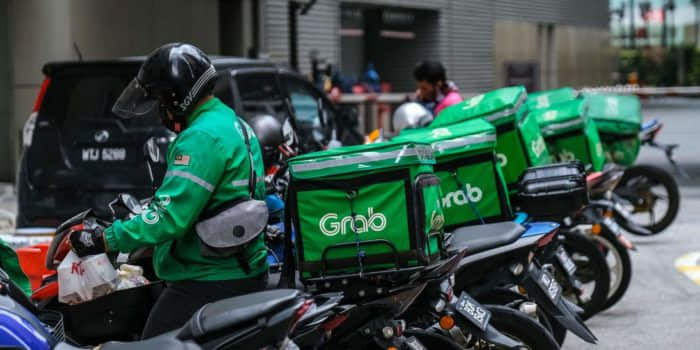Gig work is here to stay. Here’s how we can make it sustainable.
Updated 29 September, 2023 with new figures on GrabAcademy.
Technology advancements and the rising demand for flexible work are fueling the growth of the gig economy.
While flexible work allows people to juggle other priorities and explore new opportunities, it traditionally comes with other challenges such as a less predictable income stream, and a lack of career progression.
In Southeast Asia, an estimated 70 per cent of the workforce [PDF] is made of informal workers, underscoring the importance of placing guard rails around these livelihoods.
Governments in the region have started to put in place frameworks that serve to protect flexible workers.
In Singapore, authorities accepted a set of 12 recommendations late last year that work to strengthen protections for delivery riders and private-hire car drivers and certain taxi drivers. The recommendations, which will kick in from the later part of 2024, outline financial protection in the event of work injuries, as well as improve retirement adequacy for this group.
Thailand and Malaysia are setting up committees to study the gig economy further and find a sustainable balance for all parties. In Thailand, for example, a new Draft Act recognises platform workers to extend a fundamental level of work safety and social security to them.
Malaysia’s revised Budget 2023 included a RM40 million (US$9 million) package that will benefit some 30,000 gig workers. Authorities will provide gig workers a monthly allowance of RM300 (US$67) for three months as compensation as they undergo training programmes.
Making earnings sustainable
At Grab, our commitment to helping ensure earnings stability for our driver-partners forms the very foundation on which we function: pricing algorithms are built into every trip they do to meet this objective.
For a vast majority of our partners today, this is now a reality. As of the first quarter of 2023, 97 per cent of our driver-partners earn above the minimum wage benchmarks in their countries.

And in most markets, the median partner takes back at least two times the local minimum wage.
To support this momentum, our platform improvements and initiatives are aimed at raising efficiency and productivity for partners so that they can earn more.
This includes employing artificial intelligence technology to group orders by proximity so that there can be greater delivery efficiency—saving time and generating higher earnings per day for partners.
There are other product improvements in the pipeline that can be a shot in the arm for efficiency, such as functions that can reduce the time driver-partners spend waiting for food to get prepared at a merchant’s outlet. We are also looking at tweaks in areas like parking fee reimbursements and other forms of wait time compensation.
Better insurance coverage
Grab offers a range of insurance policies across our markets. This includes personal accident insurance, protecting our driver-partners against work-related incidents.
This is provided at no cost, and offers coverage up to the estimated cost of surgery for common physical trauma from accidents. Should driver-partners want to top-up their coverage for additional protection, we also provide affordable options to do so.
We provide work-related accident insurance coverage to protect all of our ride-hail and delivery partners and as of July 2022, all our markets have met the coverage levels we committed to provide.
In some markets, payouts reach at least six times of a partner’s average monthly earnings from the platform, in addition to medical expenses support in the event of an accident.
Upskilling and reaching more people
We are committed to giving our partners the tools they need to reinvent themselves, stay relevant, and be more nimble in the workforce.
GrabAcademy, for example, is a portal available to them at their fingertips—quite literally. On their partner apps, they can choose from more than 2,500 upskilling courses. Over a million partners have completed additional courses on the portal now.

There are basic financial literacy courses, as well as programmes that equip merchants with marketing tips and tricks to take their businesses to the next level.
We’re also aligned with the skills agendas of various markets, so that the training opportunities we support are relevant to different needs.
We collaborate with big players like Microsoft and Mastercard to offer training that is relevant, necessary and very much in demand among our partners. Microsoft’s Digital Literacy certification program, for instance, teaches skills like online communication, creating and managing digital content and has proven to be very popular among driver-partners.
Through our collaboration with Mastercard, our partners in Indonesia, the Philippines, and Vietnam can get equipped in areas like small business training, and even attain internationally recognised certification in cybersecurity.
Across Southeast Asia, in Indonesia, Vietnam, Singapore and Thailand, we continually establish partnerships with government agencies and educational institutions to support opportunities for upskilling.
In Indonesia, for instance, we ran two programmes in 2021 that target basic and middle-level literacy levels and reached more than 12,000 micro, small and medium enterprises.
We believe our partners’ ability to constantly upskill is key to attaining social mobility and access to more opportunities.
Our north star remains: driving Southeast Asia forward by empowering the people in this region, in a way that looks out for the welfare of those at the heart of it.
Read about our six guiding principles on the gig economy.
3 Media Close,
Singapore 138498